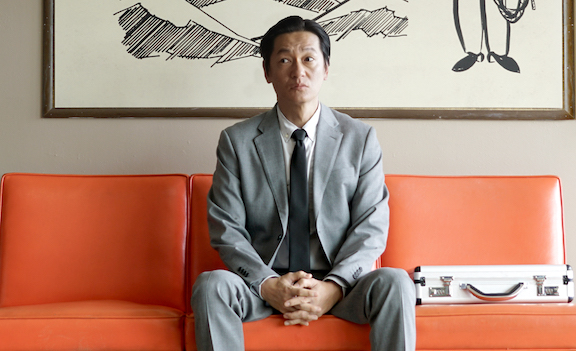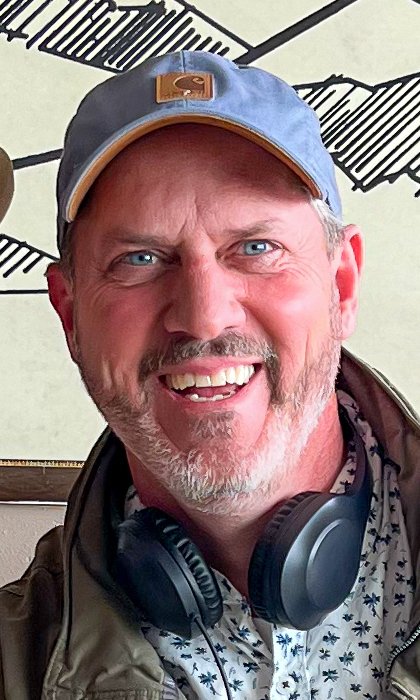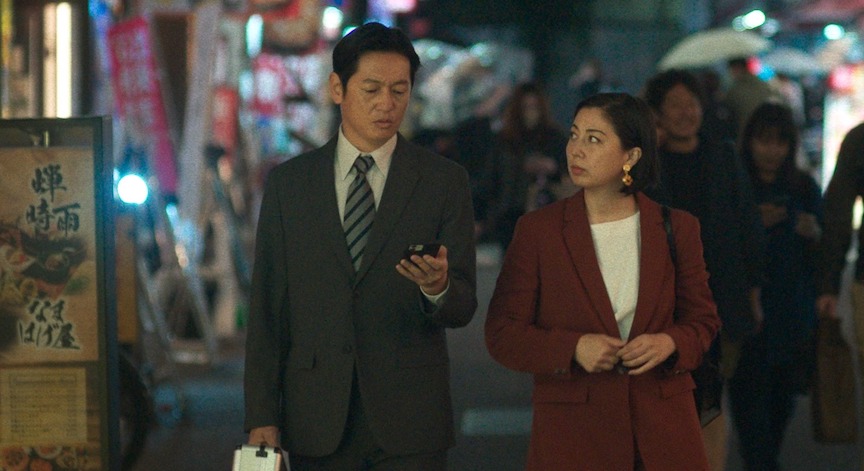
Arata Iura plays Japanese salaryman Hideki Sakai in “Tokyo Cowboy,” a new independent film directed by Marc Marriott and co-starring Goya Robles, Robin Weigert and Ayako Fujitani.
Indie pic turns tables on ‘Westerner who finds self after visiting the East’ trope.
By Alex Luu, P.C. Contributor
The new film “Tokyo Cowboy” defies easy categorization. Is it a quirky fish-out-of-water story? A sly commentary on corporate culture vs. grassroots individualism? Or a meditation on alienation?
It is all of these things and more. It also happens to be a refreshingly original piece of storytelling complete with sublime performances, breathtaking cinematography and a subtle-yet-whimsical soundtrack. Add to that unexpected and tranquil moments of emotional poignancy, this debut feature film by American director Marc Marriott is hands down one of the best films to come out in years.
“Tokyo Cowboy” traces the journey of Hideki Sakai (Arata Iura), a Japanese businessman sent by his superiors to a cattle ranch in Montana. Although owned by the Japanese company that he works for, the ranch is underperforming and on the brink of being shut down and sold. Sakai has the arduous task of convincing the ranch boss (Robin Weigert) and her ranch hands to transition the ranch to a strictly Japanese cow/wagyu beef ranch.
When he arrives in rural Montana, Sakai quickly realizes that he is absolutely ill-suited (literally and figuratively) for the job. He is given a chaperone, a Mexican ranch hand named Javi (Goya Robles), who reluctantly shows him the ropes on the ranch. What follows is the remarkable journey of an unremarkable company suit who finds himself at a crucial crossroads in life and career, a crossroads that leads to a heartrending self-discovery of belonging and community in the unlikeliest of places — Montana’s Big Sky Country.
What’s even more remarkable is Marriott’s own journey of bringing the film into fruition from a small kernel of an idea to celluloid. Decades ago, he was a young Mormon missionary in Japan and lived in Hiroshima for two years, his daily life as a typical gaijin compounded by a profound sense of disconnect.

Marc Marriott
“That experience was really impactful, and it changed me a lot, and it does relate to the film,” said Marriott. “I stuck out a lot in Japan — I was kind of this loud American. I found a little bit of humility. I learned that I had to listen more and not speak so much … and gradually opened up to the people, the culture and beliefs and that really relates to the main character, Hideki, because he also has to find a bit of humility.”
It was also around this time that Marriott read an article about a kind of subculture — Japanese employees being sent to American cattle ranches that are owned by Japanese businesses to learn how to ranch. “That idea of the ‘Japanese cowboy’ really captivated my imagination, and it stayed with me for a long time.”
Fast-forwarding roughly 30 years — after cutting his teeth as series producer and director on various shows for the History Channel, Discovery Channel, TLC, VHI, as well as reality TV — Marriott felt it was time to dive into directing a feature film. Marriott’s friend and neighbor, Brigham Taylor, was the first person to hear his pitch for “Tokyo Cowboy.”
Both men had known each other for decades and were interns at the famed Sundance Lab many years ago. Taylor, himself a veteran producer of big-budget Hollywood fare, immediately warmed up to the simple yet delightful nuances of “Tokyo Cowboy.”
“Brigham has a real sense of story and character. He liked it that it was something that doesn’t have any big, crazy special effects. He was interested in a quieter kind of film,” Marriott said. “It was around February ’20 when I pitched it to him, and then the pandemic hit. But all of a sudden that opened up this huge block of space, and within a year, we had a script.”
As much as Marriott’s infusing a bit of his own sensibilities and self-discovery in Japan that directly mirrors the main character Hideki’s evolution in Montana, the other characters and the rest of the script also had to be completely authentic. This commitment to being real and vulnerable came via Ayako Fujitani’s involvement in the project.
Fujitani, who co-stars as Hideki’s fiancée, Keiko, also co-wrote the script with Dave Boyle. “There were many times when Ayako was asking, ‘What is going on with this character (Keiko), we need to give her more, give her more!’” Marriott recalled. “And we all said yes to that! Yes, you know better about women!”

“Tokyo Cowboy” co-stars Arata Iura and Ayako Fujitani
The authenticity in “Tokyo Cowboy” is palpable, and there are no false notes in the film, from its first opening frames to its last iconic image of Hideki on a horse against the gorgeous Montana sky.
At previous screenings (especially in Japan), viewers were so impressed that Marriott was able to snag Iura for the role of Hideki. “So many people came up to me and said they were amazed that I was able to get the ‘Tom Cruise’ of Japan to be in my movie!” It is arguable whether the Cruise comparison is accurate (that’s like saying the legend Hayao Miyazaki is Japan’s Walt Disney, not exactly the same), but what’s undeniable is Iura’s understated performance. His eyes reveal the depth of his character’s awkwardness, heartbreak and ultimate joy. There’s one pivotal scene that takes place at Javi’s niece’s quinceañera that will no doubt bring tears to viewers, a true testament to the perfect combination of Iura’s acting and Marriott’s masterful directing.
It is no surprise that “Tokyo Cowboy” has already racked up a slew of awards, including Best Narrative Feature at the Vermont Film & Folklore Festival, Tallgrass Film Festival, Sedona International Film Festival and San Luis Obispo International Film Festival, as well as Best Cinematography and Best Editing at the Zion Indie Film Festival. It also has had the honor of being the Closing Night Film at the Osaka Asian Film Festival.
But perhaps the most impressive response to the film is that countless audience members have told Marriott that the film genuinely feels like it was directed by a Japanese filmmaker. They’re not wrong. “Tokyo Cowboy” has the meditative tone of the films of Yasujirō Ozu.
There is one line of dialogue in the film that encapsulates its various themes, delivered by Javi to Hideki: “You have to learn their language, and I’m not talking about English!” Hideki gradually learns how to do this, blossoms and grows as a human being. Likewise, Marriott has also done this as a filmmaker, and the result is nothing short of a miraculous gem of a movie that stands to be the indie darling of the year and beyond.
“Tokyo Cowboy” screens at the AMC Empire 25 in New York City and the AMC Burbank 16 beginning Friday, Aug. 30. Check local listings as distribution expands. To view a trailer of “Tokyo Cowboy,” visit tinyurl.com/mryxcrbx.



